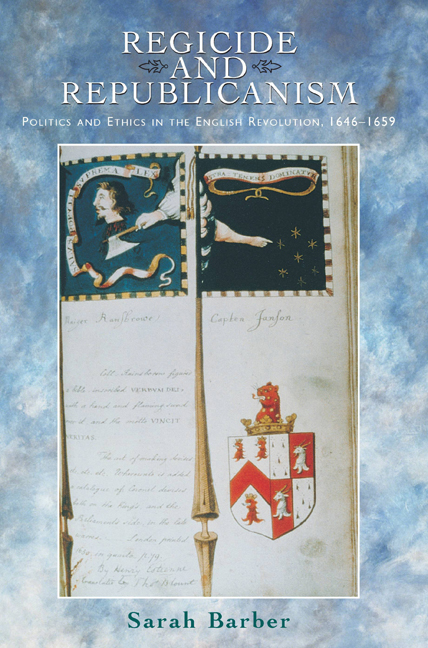Book contents
- Frontmatter
- Contents
- Preface
- List of Abbreviations
- Introduction: Regicide and Republicanism
- 1 Unparliamentary Language and the Dignity of the Crown
- 2 ‘A Mere Man’: Charles Levelled
- 3 The Expense of Blood and Treasure
- 4 King Ahab
- 5 Queen Justice
- 6 Government New Modelled?
- 7 The Engagement of Loyalty
- 8 The Active and the Passive Life
- Epilogue: The Good Old Cause
- Select Bibliography of Printed Sources
- Index
- Frontmatter
- Contents
- Preface
- List of Abbreviations
- Introduction: Regicide and Republicanism
- 1 Unparliamentary Language and the Dignity of the Crown
- 2 ‘A Mere Man’: Charles Levelled
- 3 The Expense of Blood and Treasure
- 4 King Ahab
- 5 Queen Justice
- 6 Government New Modelled?
- 7 The Engagement of Loyalty
- 8 The Active and the Passive Life
- Epilogue: The Good Old Cause
- Select Bibliography of Printed Sources
- Index
Summary
And what is faith, love, virtue unassayed
Alone, without exterior help sustained?
Milton, Paradise Lost (1667)It is your own assent to yourself, and the constant voice of your own reason, and not of others, that should make you believe.
Pascal, Pensées (1670)Henry Marten, republican firebrand and man about town, believed that a dedicatory Epistle was as a porch to a house, a place where authors gather friends and supporters around themselves to protect them from the storms of potential critics. It pains me to say it, but I do not believe he is right. Others have likened writing a book to giving birth. I do not believe that either, but the imagery may be more appropriate. Producing the bulk of a book is the time when you gather to yourself the thoughts, contributions and criticisms of your friends. The preface marks the symbolic cutting of the umbilical cord and you and your precious thoughts are propelled into the world alone. In the hackneyed phrase of preface-writing, one is grateful to friends and colleagues for their help and contributions, but what goes to press is entirely the author's responsibility.
One of my lecturers at university (not, perhaps significantly, an historian) held that a human being does not have an original thought after the age of twenty-six, but continually refines, builds on and analyses thoughts sown much earlier. This volume certainly bears out that statement, since the simple idea at the heart of this book, which seemed so obvious at the time, came to me as part of my Ph.D. research, and that in itself was a continuation of several years of thought about the nature of republicanism and the British people's love affair with monarchy. When I began I was a lone voice. Only in the USA had Bill Everdell produced his End of Kings, and he too had to wait some time to see it in print. saying, in 1983, ‘they’ll never give you a grant to study that!’ and to the grant-awarding bodies which did not.
- Type
- Chapter
- Information
- Regicide and RepublicanismPolitics and Ethics in the English Revolution, 1646–1659, pp. vii - viiiPublisher: Edinburgh University PressPrint publication year: 2020



